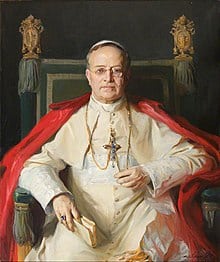
POPE PIUS XI
On May15, 1931, Pope Pius XI published his encyclical Quadragesimo Anno to commemorate the 40 years since Pope Leon XIII published his Encyclical Rerum Novarum on the condition of workers in 1891. Before the publication of his encyclical, Pius XI invited Marian Wielezynski to the Vatican to explain his vision of employee shareholding summarized here in Wielezynski’s own words:
“The management principles of Gazolina joint stock company are that justice and a sense of duty must prevail over our company, and the will to help each other must also prevail…”
In paragraph 110 of Quadragesimo Anno, Pius XI echoed Marian Wielezynski’s philosophy:
“The twofold character, that is individual and social, both of capital or ownership and of work or labor must be given due and rightful weight. Relations of one to the other must be made to conform to the laws of strictest justice – commutative justice, as it is called.”
The Pope argued that laisser-faire capitalism and socialism were equally flawed and exploitative. He favored economic mechanisms such as cooperatives and member-owned organizations as well as small businesses and antitrust regulations. He demanded more solidarity, especially between employers and employees, through new forms of cooperation and communication. Pope Pius XI had a negative view of anonymous international financial markets. His encyclical has been an important inspiration to modern thought regarding a greater solidarity than present capitalism offers.
Here is a story my father told me about our grandfather’s visit to Rome in 1931.
“After meeting with Pius XI at the Vatican, my father was invited to visit the catacombs outside of Rome. When he returned to Lwow, he told us how impressed and deeply moved he had been by the courage of persecuted early Christians who took refuge in the deep underground darkness, sometimes for long periods. He finally came to the conclusion that the light they were carrying in their hearts kept them alive because it was so bright and so strong that it could pierce the deep underground darkness. My father was not overly religious but he admitted that his trip to Rome had a profound effect on him.”
